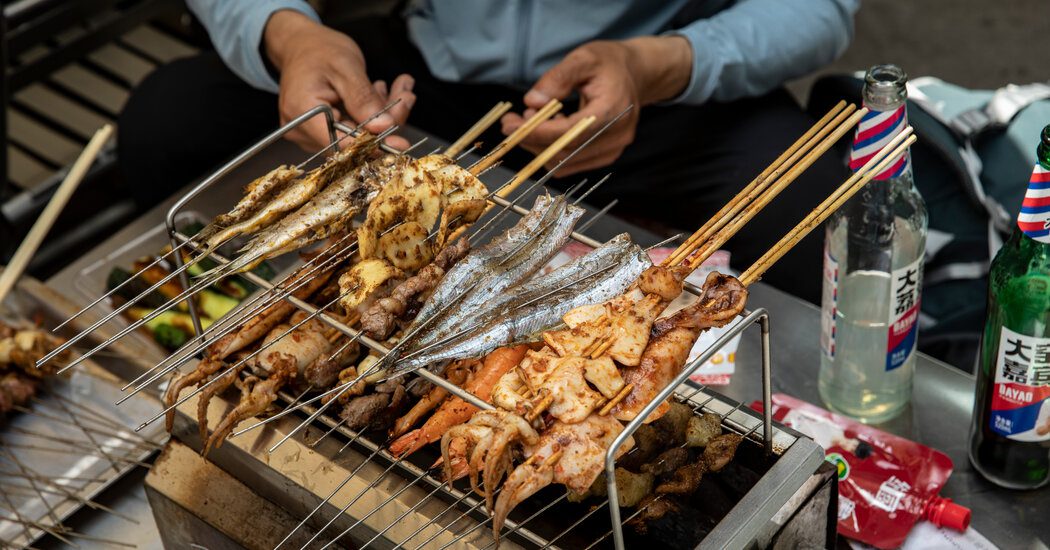Global Courant 2023-05-21 14:00:21
The flame-shaped neon arc was visible from miles away, which was good, because there was little other reason for anyone to be in that part of town, a sprawling area outside an industrial city in eastern China. The lights flickered between icy blue and red hot, leaping into the night sky next to a large sign: “Zibo Barbecue Experiential Ground.”
And what an experience awaited. In this Coachella for barbecue, visitors could pose with a mascot dressed as a meat skewer. They could watch a concert against an LED background of radiant flames. They could eat from one of hundreds of grills dotted around the 12-football-field-sized property—if they had to wait hours for a table and if the meat supplier of their choice didn’t run out of food.
Zibo, a once obscure chemical manufacturing town in Shandong province, has suddenly strangely – thanks to, of all things, barbecue – turned into China’s most popular tourist destination.
This city of 4.7 million people received 4.8 million visitors in March after it began to attract attention on social media. During a holiday earlier this month, a vegetable market in Zibo was more popular than the Great Wall, according to a mapping service. High-speed train tickets from Beijing sold out a minute after they were released.
The local government has set up 21 buses to transport visitors from the train station directly to barbecue restaurants. They hosted the barbecue festival on the site of a sprawling fish market, the only place large enough to hold 10,000 people.
“We’ve all eaten well, but this kind of bustle, this warmth, is hard to come by,” said Zhang Kexin, a senior student who bought six souvenir trays of fried crackers within half an hour of arriving in Zibo during the recent vacation, another local speciality.
Ms. Zhang had traveled 500 miles from Shanxi Province – a journey she had never considered before, even though Zibo was a friend’s hometown. “I thought it was a very ordinary place,” she laughed.
The question of why exactly this ordinary place got off the ground has seemingly preoccupied all of China, even with officials in other cities send research teams to Zibo to try to match its success. Most accounts attribute the craze’s origins to college students, some of whom posted on social media about the delights of the local barbecue style. Diners grill their own skewers on table-top charcoal stoves, giving the meal a DIY feel, and wrap them in a local specialty of tortilla-style shells, alongside a sprig of raw green onion and a smear of hot sauce.
The cheap prices were also a draw – skewers start at 15 cents at the most popular restaurants – so other young people started flocking to town. Influencers followed.
But perhaps most crucial has been the fact of how unexpected Zibo’s emergence was. As a result, the locals – seemingly unable to believe their luck – have done everything they can to keep the frenzy alive.
Residents have offered their homes to strangers who couldn’t find a hotel. After some social media users joked that they wanted eye candy with their barbecue, officials organized a “180 group” – men taller than 6 feet 11 inches, or 5 feet 11 inches, and wearing suits – to greet arrivals at the train station.
There were no suitable men to be seen at the station during the 1 May holiday. But there were plenty of other cheerful greeters, handing out bottles of water, sunscreen, watermelon (grown in a suburb of Zibo), mouthwash (for after the barbecue), even flasks of local spirits.
“Welcome, visitors from out of town! I hope you’re having fun!” one woman yelled as she pressed pumpkin-flavored crackers into the hands of the arrivals, many already overflowing with freebies.
For many visitors, the crazy crowds are the point, after China’s lengthy Covid lockdowns. At one of the most popular barbecue restaurants, where hundreds of diners sat on small folding stools around outdoor grills, officials designated a raised viewing platform so tourists could see people eating below through a cloud of cumin-scented smoke.
Li Yang, a local, was left sitting at a table around 6:00 PM, after queuing at 3:00 AM. His commute to work at a steel company was now clogged with traffic. But he didn’t mind.
“To see all this vibrancy, after three years of the pandemic, my heart feels pretty warm,” he shouted, over the sound of maracas being shaken by four men, seemingly unconnected to the restaurant, who gallop between tables to bring dinners.
A few tables away, Bai Lingbin, 25, was already digging, after waiting since midnight. His grill, shared with four other men, was studded with wafer-thin skewers of crispy pork skin, sweet potatoes, and wraps.
Mr. Bai, who had traveled from Anhui province, was frank: he prefers barbecuing in northeastern China, another famous grilling region. But, he declared as he raised a beer for his table mates he’d met in line, “The atmosphere here is the best.”
Still, some locals secretly admit that they want to see their hometown’s sudden fame fade, at least a little.
Barbecue restaurant staff said they only slept a few hours a night. Residents who used to shop at the suddenly popular vegetable market – where there are now almost no vegetables to be seen, while snack and souvenir vendors have piled up – have to look for their products elsewhere.
There was a lot of pressure to keep customers happy, however, as the government was determined to keep Zibo’s streak, said Wang Jiuyuan, the manager of a barbecue spot 30 minutes’ drive from the city center but still overrun. Mr. Wang had put posters on every table asking customers to be patient because many waiters spoke only the local dialect.
“We are afraid that a complaint will be made against us, because as long as it is an out-of-town customer, the government will accept it whether it is reasonable or not,” said Mr. Wang, adding that the restaurant was berated after a customer complained that he was not seated.
Some online are concerned that pressure on locals to be accommodating has gone too far, especially after a viral video showed a restaurant owner kneeling down to ask forgiveness from a customer upset by long lines.
Last month, even Zibo’s government appeared to back down and urge people to visit other nearby towns as it was overwhelmed.
Along a quiet road on the outskirts of town, workers in aging factories were kneading handmade sesame chips, a local delicacy that had also seen a boost in orders as tourists poured in, said Gao Juan, a factory owner.
Ms. Gao had considered switching to making the barbecue wraps, which were in even higher demand. Sellers of those wraps were already taking orders for August.
But the machines to make those wraps were sold out. Ms. Gao was willing to think long and hard about whether the craze would last.
“When there’s a shortage in the market, it’s easy to overreact,” she said. “Let’s wait.”
Li You contributed to research.








